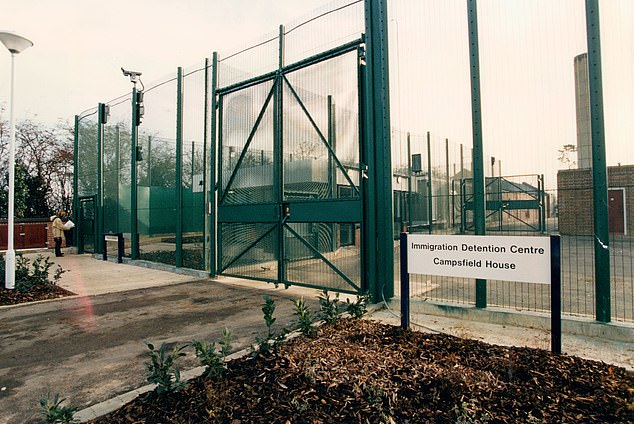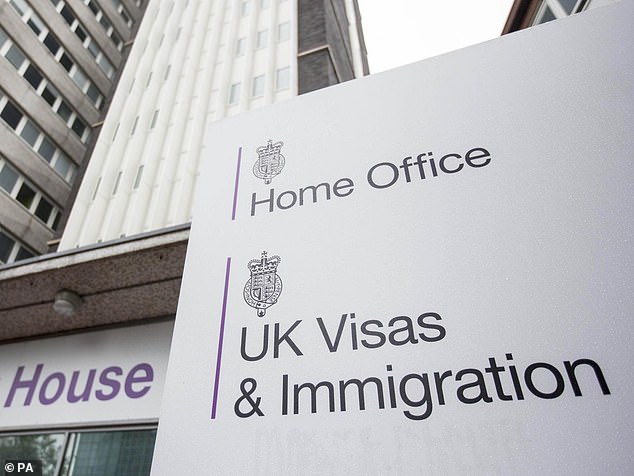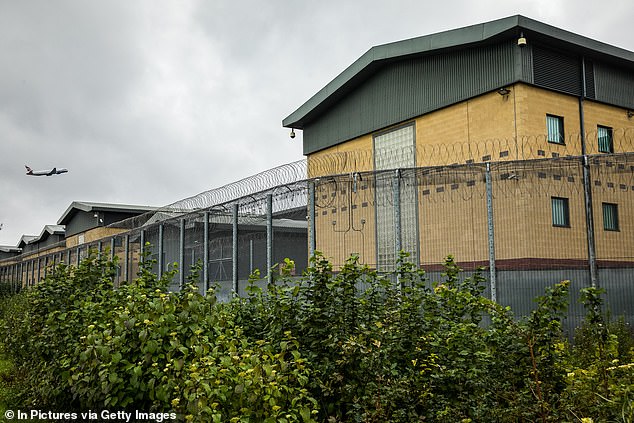The Home Office has advertised for a religious adviser to help detained migrants get married – despite the risk of sham ceremonies.
The vacancy for the religious affairs manager post is at Campsfield House Immigration Removal Centre, near the village of Kidlington, Oxfordshire.
It was announced last year the immigration detention facility near Oxford would be reopened after it shut in 2018 amid riots, escapes and poor conditions.
The centre, which has space for up to 400 people waiting for their immigration status to be resolved, is now expected to open its doors in December.
Among the ‘main duties’ on the ad for its religious adviser is needing to ‘counsel residents who request marriage while in custody and make any arrangements for the wedding’.
It comes as part of the ‘comprehensive programme of religious activities’, including ‘pastoral care’, they must provide for the various faiths represented at the facility.
Detainees – which includes convicted criminals and refused asylum seekers awaiting removal – can under human rights law marry while in such centres.
This is despite the risk of so-called ‘sham’ ceremonies, which can see detained migrants tie the knot with a British citizen to try to avoid deportation.

The vacancy for the religious affairs manager post is at Campsfield House Immigration Removal Centre (pictured), near the village of Kidlington, Oxfordshire
Among the ‘main duties’ on the ad (pictured) for its religious adviser is needing to ‘counsel residents who request marriage while in custody and make any arrangements for the wedding’

Detainees – which includes convicted criminals and refused asylum seekers awaiting removal – can under human rights law marry while in such centres. Pictured: File photo
The advert has since been taken down by the Home Office but there are postings for the role still available online on other websites.
The Home Secretary can order an investigation of the couple on these grounds.
To stop the marriage going ahead, investigators would have to show one or both people were foreign nationals and they did not have a ‘genuine relationship’.
They would also need to show one or both people were marrying ‘for the purpose of circumventing UK immigration controls’.
But marriages or civil partnerships can take place in detention centres if there is no legal impediment and the couple has complied with any Home Office investigation.
They must also be able to be escorted to the ceremony ‘without disrupting the smooth running of the centre’.
Guidance from the Home Office notes: ‘Getting married or entering a civil partnership to gain an immigration advantage is not a legal impediment and, in any event, only a registrar may prevent a marriage/civil partnership on this ground.’
The job ad also notes the religious advisor must provide appropriate rooms, literature and artefacts for detainees to observe their faith.

The advert (pictured) has since been taken down by the Home Office but there are postings for the role still available online on other websites
They must also issue communications to staff and ‘residents’ about any religious festivals being observed.
And the adviser should be informed in their work by the practices of ‘outside faith communities’, which they are to remain in touch with.
It comes after a row at another detention centre where thousands of pounds are being spent to hire staff to teach ballooncraft, cake decorating and floristry.
A hairdressing tutor, hospitality and floristry tutor, painting and decorating tutor and gym manager are among the 32 jobs currently available at Heathrow Immigration Removal Centre.
Salaries for the full-time roles at the male-only facility are more than £30,000 a year – with the gym manager role being advertised for £38,873.66 per annum.
The combined yearly spend of all the jobs has been considered an insult to tax payers, with Tory ministers warning: ‘The Government has lost the plot.’
The roles first appeared on the Government’s Find A Job website last week and are still available.
But Home Office Minister Seema Malhorta said the department had asked for the roles to be scrapped as they ‘don’t believe all these roles are necessary’.

It comes after a row at Heathrow Immigration Removal Centre (pictured, file photo of one wing of it), where a hairdressing tutor, hospitality and floristry tutor, painting and decorating tutor and gym manager are among the 32 jobs currently available
The jobs have been advertised by Mitie – a facilities firm that is required to provide recreational services to detainees as part of its 2014 £290million contract with the Home Office.
Some 1,940 people were being held under immigration powers in the UK as of December last year.
There are currently seven immigration removal centres, four short-term facilities for holding people for up to a week and one pre-departure accommodation centre.
Along with Campsfield House, the Government is also planning to open Haslar Immigration Removal Centre in the town of Gosport, Hampshire.
More than 31,000 migrants have come to the UK across the Channel this year, which is 40 per cent up from the same time last year.
This is also the highest number since arrivals began in 2018.
More than 50,000 have come to Britain since Labour took over in July last year.
A Home Office spokesperson has previously said: ‘We have recently started working with immigration removal centre providers to set out what this Government expects from education and activities across the detention estate.

More than 31,000 migrants (pictured, file photo) have come to the UK across the Channel this year, which is 40 per cent up from the same time last year
‘At the same time, the scope and responsibilities of all planned recruitment for Immigration Removal Centres continue to be actively reviewed.’
Migrants are detained for administrative reasons, rather than it being a kind of criminal imprisonment – though the conditions are similar.
It is done for a variety of purposes, including establishing an asylum seeker’s identity or the basis of their claim, or as a precursor to removing them from the UK.
Other reasons include the belief a given person’s release on immigration bail would not be ‘conducive to the public good’ or might lead to them absconding.
Non-citizens can be detained at any point in the immigration process.
This includes immediately after arrival in the UK, either while they wait for their claim to be examined or if it has been refused and they are awaiting removal.
It could follow visiting an immigration office in the country, during a check-in with immigration officials or arrest by a police officer.
Those who have overstayed their visa or leave to remain, could also be detained.
Someone who has just finished a prison sentence could also continue to be detained under immigration powers, either in a prison or removal centre.
Most immigration detention either ends in removal from the UK or release into the community, normally on immigration bail.
The Home Office has been contacted for comment.












